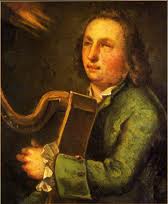Annotation:Nancy Cooper (2)
X:1 T:Nancy Cooper [2] C:Turlough O'Carolan (?) M:3/4 L:1/8 Q:"Slow" S:Hugh O'Beirne, 1846, piper from Ballinamore, Co. Leitrim, via William Forde B:Joyce - Old Irish Folk Music and Songs (1909, No. 621) Z:AK/Fiddler's Companion K:Gmix e|d2c2 (3AGA|(3GAc d2 de|dcAG (3Acd| ed2 !fermata!d f|d2 cA (3AGA|GF D2 Df|dcAGcA|G2 !fermata!G3||
NANCY COOPER [2]. Irish, Planxty or Slow Air (3/4 time). G Mixolydian. Standard tuning (fiddle). One part. Composed by Turlough O'Carolan. Joyce's source O'Beirne remarked "'one of the oldest.'" The tune was recorded by the Belfast Northern Star of July 15, 1792, as having been played in competition by one of ten Irish harp masters at the last great convocation of ancient Irish harpers, the Belfast Harp Festival, held that week. Donal O'Sullivan included the melody in his definitive work on O'Carolan, but noted that there was no incontrovertible evidence that it was composed by him, unlike "Nancy Cooper (1)," which has a more established pedigree.

O'Sullivan (1958) identifies a member of the Cooper family of County Sligo as the subject of both airs. The family descended from Edward Cooper, a Cornet in Richard Collooney's regiment of dragoons, who came into a large estate in County Sligo. His son, Arthur Cooper, had two sons and five daughters, of whom the third daughter was named Anne. She married John Perceval, of Temple House, County Sligo, on Oct. 7th, 1722, and O'Sullivan believes O'Carolan's tunes are in her honor. Words to the tune are given in Thadaeus Connellan's An Duanaire (Fonna Seanma) (1829), headed "Anna Cupar. Miss Nancy Cooper, County Sligo. By Carolan," which would seem to cement the identification.
- ↑ P.W. Joyce concluded that O'Beirne had been a fiddler in his Old Irish Folk Music and Songs (1909, p. 296). However, William Forde, the only collector who had direct contact with O'Beirne, wrote in a letter to John Windele of Cork, dated Sept. 21, 1846, that he had obtained over 150 airs from a piper, Huge Beirne. Forde was seeking to supplement his collection with music from Connaught and the north, and was glad to make the musician's acquaintance, staying on in Ballinamore longer than he originally planned. He also found O'Beirne in poor health in the time of Great Famine, writing "Stirabout and bad potatoes were working fatally on a sinking frame," and aided the piper by improving his diet ("but a mutton chop twice a day has changed Hugh's face wonderfully").

